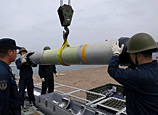
SHANGHAI, May 29 (Xinhua) -- Resistance to the main flu drug Tamiflu has been observed in infections with H7N9 avian influenza virus, according to a newly published study by Chinese medical scientists.
Of 14 H7N9 patients monitored in Shanghai, treatment with antiviral medications led to a lowering of viral load on throat swabs in all but three, showed research led by researcher Yuan Zhenghong of Shanghai Medical College of Fudan University.
Those three developed severe illness that required extracorporeal membrane oxygenation, and two died, showed the study report published online by medical journal The Lancet on Wednesday.
The report said the emergence of antiviral resistance in H7N9 viruses is concerning and needs to be closely monitored and considered in pandemic preparedness planning.
Wen Yumei, head of the expert team on H7N9 prevention and control, said the study indicated that Tamiflu remains useful for most of the patients.
She noted, however, that it is particularly important to speed up research and development of new drugs for the disease.
H7N9 was first reported in March in China.
Beijing health authorities on Tuesday reported a second human infection with the virus in the Chinese capital, bringing the total number of infections with the bird flu in the Chinese mainland to 131, 37 of which have ended in death.
In a statement issued on Monday, the National Health and Family Planning Commission said that no evidence of human-to-human transmission has been detected so far.
















 Modern movie dream in retro Mingguo street
Modern movie dream in retro Mingguo street


![]()
